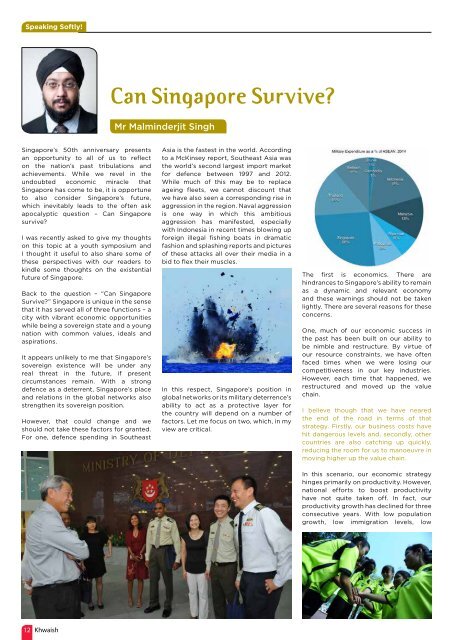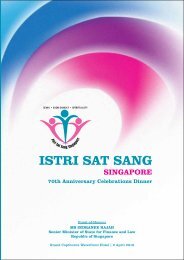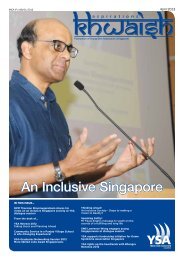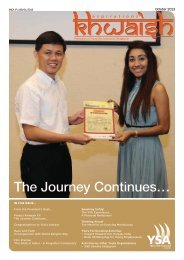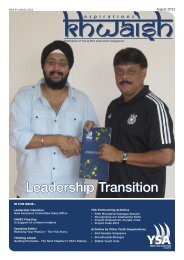Khwaish Oct 2015
Create successful ePaper yourself
Turn your PDF publications into a flip-book with our unique Google optimized e-Paper software.
Speaking Softly!<br />
Can Singapore Survive?<br />
Mr Malminderjit Singh<br />
Singapore’s 50th anniversary presents<br />
an opportunity to all of us to reflect<br />
on the nation’s past tribulations and<br />
achievements. While we revel in the<br />
undoubted economic miracle that<br />
Singapore has come to be, it is opportune<br />
to also consider Singapore’s future,<br />
which inevitably leads to the often ask<br />
apocalyptic question – Can Singapore<br />
survive?<br />
I was recently asked to give my thoughts<br />
on this topic at a youth symposium and<br />
I thought it useful to also share some of<br />
these perspectives with our readers to<br />
kindle some thoughts on the existential<br />
future of Singapore.<br />
Back to the question – “Can Singapore<br />
Survive?” Singapore is unique in the sense<br />
that it has served all of three functions – a<br />
city with vibrant economic opportunities<br />
while being a sovereign state and a young<br />
nation with common values, ideals and<br />
aspirations.<br />
It appears unlikely to me that Singapore’s<br />
sovereign existence will be under any<br />
real threat in the future, if present<br />
circumstances remain. With a strong<br />
defence as a deterrent, Singapore’s place<br />
and relations in the global networks also<br />
strengthen its sovereign position.<br />
However, that could change and we<br />
should not take these factors for granted.<br />
For one, defence spending in Southeast<br />
Asia is the fastest in the world. According<br />
to a McKinsey report, Southeast Asia was<br />
the world’s second largest import market<br />
for defence between 1997 and 2012.<br />
While much of this may be to replace<br />
ageing fleets, we cannot discount that<br />
we have also seen a corresponding rise in<br />
aggression in the region. Naval aggression<br />
is one way in which this ambitious<br />
aggression has manifested, especially<br />
with Indonesia in recent times blowing up<br />
foreign illegal fishing boats in dramatic<br />
fashion and splashing reports and pictures<br />
of these attacks all over their media in a<br />
bid to flex their muscles.<br />
In this respect, Singapore’s position in<br />
global networks or its military deterrence’s<br />
ability to act as a protective layer for<br />
the country will depend on a number of<br />
factors. Let me focus on two, which, in my<br />
view are critical.<br />
The first is economics. There are<br />
hindrances to Singapore’s ability to remain<br />
as a dynamic and relevant economy<br />
and these warnings should not be taken<br />
lightly. There are several reasons for these<br />
concerns.<br />
One, much of our economic success in<br />
the past has been built on our ability to<br />
be nimble and restructure. By virtue of<br />
our resource constraints, we have often<br />
faced times when we were losing our<br />
competitiveness in our key industries.<br />
However, each time that happened, we<br />
restructured and moved up the value<br />
chain.<br />
I believe though that we have neared<br />
the end of the road in terms of that<br />
strategy. Firstly, our business costs have<br />
hit dangerous levels and, secondly, other<br />
countries are also catching up quickly,<br />
reducing the room for us to manoeuvre in<br />
moving higher up the value chain.<br />
In this scenario, our economic strategy<br />
hinges primarily on productivity. However,<br />
national efforts to boost productivity<br />
have not quite taken off. In fact, our<br />
productivity growth has declined for three<br />
consecutive years. With low population<br />
growth, low immigration levels, low<br />
12 <strong>Khwaish</strong>


